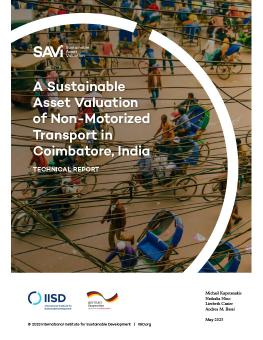
A Sustainable Asset Valuation of Non-Motorized Transport in Coimbatore, India
This Sustainable Asset Valuation (SAVi) focuses on the added economic, social, and environmental benefits and avoided costs of a new non-motorized transport (NMT) network in Coimbatore, India.
The Coimbatore City Municipality Corporation identified 300 km of non-motorized transport (NMT) routes throughout their city, and the network is being implemented over the next 15 years. The plan will benefit around 60% of the city's population and improve the local environment. This SAVi assessment integrates a monetary valuation of social and environmental impacts, such as health and CO2 emissions (as well as economic benefits), into the traditional cost-benefit analysis process often used to assess transport infrastructure decisions. This project is highly profitable in terms of added economic, social, and environmental benefits and reduced costs for the city, which add up to USD 486.1 million.
These knock-on effects are often overlooked in the current cost-benefit analysis process that most transport infrastructure decision making is based on. We hope that the results of this SAVi assessment can be used by various stakeholders, including policy-makers, investors, and planners, to make informed decisions and advocate for sustainable transport projects.
